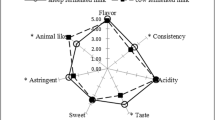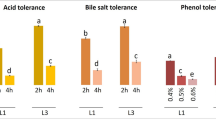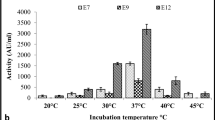Abstract
The storage and transportation of raw milk at low temperatures promote the growth of psychrotrophic bacteria and the production of thermo-stable enzymes, which pose great threats to the quality and shelf-life of dairy products. Though many studies have been carried out on the spoilage potential of psychrotrophic bacteria and the thermo-stabilities of the enzymes they produce, further detailed studies are needed to devise an effective strategy to avoid dairy spoilage. The purpose of this study was to explore the spoilage potential of psychrotrophic bacteria from Chinese raw milk samples at both room temperature (28 °C) and refrigerated temperature (7 °C). Species of Yersinia, Pseudomonas, Serratia, and Chryseobacterium showed high proteolytic activity. The highest proteolytic activity was shown by Yersinia intermedia followed by Pseudomonas fluorescens (d). Lipolytic activity was high in isolates of Acinetobacter, and the highest in Acinetobacter guillouiae. Certain isolates showed positive β-galactosidase and phospholipase activity. Strains belonging to the same species sometimes showed markedly different phenotypic characteristics. Proteases and lipases produced by psychrotrophic bacteria retained activity after heat treatment at 70, 80, or 90 °C, and proteases appeared to be more heat-stable than lipases. For these reasons, thermo-stable spoilage enzymes produced by a high number of psychrotrophic bacterial isolates from raw milk are of major concern to the dairy industry. The results of this study provide valuable data about the spoilage potential of bacterial strains in raw milk and the thermal resistance of the enzymes they produce.
中文概要
目的
探究从原料奶样品中分离到的480 株嗜冷菌(鉴定为24 个属、74 个种,并根据随机扩增多态性DNA(RAPD)图谱特征聚类为85 组)在室温和低温下产腐败酶的能力,以及这些腐败酶的耐热性。
创新点
系统地分析和比较不同种类的嗜冷菌在室温和低温下产腐败酶的能力,并探究这些腐败酶的耐热性,为控制乳制品和其它低温储藏食品的腐败变质提供理论基础。
方法
采用不同的筛选培养基评估480 株嗜冷菌在室温(28 °C)和低温(7 °C)产蛋白酶、脂肪酶、磷脂酶及β-半乳糖苷酶的能力;根据初筛的结果分别以偶氮酪蛋白和对硝基苯酚棕榈酸酯为底物定量测定蛋白酶和脂肪酶的酶活力;挑选酶活力高的蛋白酶和脂肪酶,分别测定经70、80 和90 °C 条件下处理一段时间后的残留酶活计算出热稳定性,并根据热动力学公式计算相关的热力学参数。
结论
Pseudomonas、Serratia 及Chryseobacterium 产蛋白酶的能力强,而Yersinia intermedia 产蛋白酶的活力最高;Acinetobacter 产脂肪酶的能力强,其中Acinetobacter guillouiae 产脂肪酶的活力最高;而一些特定的属能产生β-半乳糖苷酶及磷脂酶。细菌产腐败酶的能力在种水平上表现出差异性(如Pseudomonas fluorescens和Pseudomonas fragi)。大量的蛋白酶及脂肪酶即使经高温热处理后仍有酶活残留,且所得的热灭活动力学的参数证实这些腐败酶经常规方法灭菌后仍对乳制品的品质及货架期有潜在的危害。
Similar content being viewed by others
References
Abdou AM, 2003. Purification and partial characterization of psychrotrophic Serratia marcescens lipase. J Dairy Sci, 86(1):127–132. https://doi.org/10.3168/jds.S0022-0302(03)73591-7
Andersson RE, Hedlund CB, Jonsson U, 1979. Thermal inactivation of a heat-resistant lipase produced by the psychrotrophic bacterium Pseudomonas fluorescens. J Dairy Sci, 62(3):361–367. https://doi.org/10.3168/jds.S0022-0302(79)83252-X
Baglinière F, Salgado RL, Salgado CA, et al., 2017. Biochemical characterization of an extracellular heat-stable protease from Serratia liquefaciens isolated from raw milk. J Food Sci, 82(4):952–959. https://doi.org/10.1111/1750-3841.13660
Baruzzi F, Lagonigro R, Quintieri L, et al., 2012. Occurrence of non-lactic acid bacteria populations involved in protein hydrolysis of cold-stored high moisture Mozzarella cheese. Food Microbiol, 30(1):37–44. https://doi.org/10.1016/j.fm.2011.10.009
Baur C, Krewinkel M, Kutzli I, et al., 2015. Isolation and characterisation of a heat-resistant peptidase from Pseudomonas panacis withstanding general UHT processes. Int Dairy J, 49:46–55. https://doi.org/10.1016/j.idairyj.2015.04.009
Bekker A, Steyn L, Charimba G, et al., 2015. Comparison of the growth kinetics and proteolytic activities of Chryseobacterium species and Pseudomonas fluorescens. Can J Microbiol, 61(12):977–982. https://doi.org/10.1139/cjm-2015-0236
Bekker A, Jooste P, Steyn L, et al., 2016. Lipid breakdown and sensory analysis of milk inoculated with Chryseobacterium joostei or Pseudomonas fluorescens. Int Dairy J, 52:101–106. https://doi.org/10.1016/j.idairyj.2015.09.003
Buchon L, Laurent P, Gounot AM, et al., 2000. Temperature dependence of extracellular enzymes production by psychrotrophic and psychrophilic bacteria. Biotechnol Lett, 22(19):1577–1581. https://doi.org/10.1023/A:1005641119076
Caldera L, Franzetti L, van Coillie E, et al., 2016. Identification, enzymatic spoilage characterization and proteolytic activity quantification of Pseudomonas spp. isolated from different foods. Food Microbiol, 54:142–153. https://doi.org/10.1016/j.fm.2015.10.004
Capodifoglio E, Vidal AMC, Lima JAS, et al., 2016. Lipolytic and proteolytic activity of Pseudomonas spp. isolated during milking and storage of refrigerated raw milk. J Dairy Sci, 99(7):5214–5223. https://doi.org/10.3168/jds.2015-10453
Champagne CP, Laing RR, Roy D, et al., 1994. Psychrotrophs in dairy products: their effects and their control. Crit Rev Food Sci Nutr, 34(1):1–30. https://doi.org/10.1080/10408399409527648
Chen L, Daniel RM, Coolbear T, 2003. Detection and impact of protease and lipase activities in milk and milk powders. Int Dairy J, 13(4):255–275. https://doi.org/10.1016/S0958-6946(02)00171-1
Chen W, Chen H, Xia Y, et al., 2009. Immobilization of recombinant thermostable β-galactosidase from Bacillus stearothermophilus for lactose hydrolysis in milk. J Dairy Sci, 92(2):491–498. https://doi.org/10.3168/jds.2008-1618
Cusato S, Gameiro AH,Sant' Ana AS, et al., 2014. Assessing the costs involved in the implementation of GMP and HACCP in a small dairy factory. Qual Assur Saf Crops Foods, 6(2):135–139. https://doi.org/10.3920/QAS2012.0195
Decimo M, Morandi S, Silvetti T, et al., 2014. Characterization of Gram-negative psychrotrophic bacteria isolated from Italian bulk tank milk. J Food Sci, 79(10):M2081–M2090. https://doi.org/10.1111/1750-3841.12645
Deeth HC, Khusniati T, Datta N, et al., 2002. Spoilage patterns of skim and whole milks. J Dairy Res, 69(2):227–241. https://doi.org/10.1017/S0022029901005301
Glück C, Rentschler E, Krewinkel M, et al., 2016. Thermostability of peptidases secreted by microorganisms associated with raw milk. Int Dairy J, 56:186–197. https://doi.org/10.1016/j.idairyj.2016.01.025
Gurung M, Nam HM, Tamang MD, et al., 2013. Prevalence and antimicrobial susceptibility of Acinetobacter from raw bulk tank milk in Korea. J Dairy Sci, 96(4):1997–2002. https://doi.org/10.3168/jds.2012-5965
Law BA, Sharpe ME, Chapman HR, 1976. The effect of lipolytic Gram-negative psychrotrophs in stored milk on the development of rancidity in Cheddar cheese. J Dairy Res, 43(3):459–468. https://doi.org/10.1017/S0022029900016046
Lilbaek HM, Fatum TM, Ipsen R, et al., 2007. Modification of milk and whey surface properties by enzymatic hydrolysis of milk phospholipids. J Agric Food Chem, 55(8):2970–2978. https://doi.org/10.1021/jf062705b
Ma Y, Barbano DM, Santos M, 2003. Effect of CO2 addition to raw milk on proteolysis and lipolysis at 4°C. J Dairy Sci, 86(5):1616–1631. https://doi.org/10.3168/jds.S0022-0302(03)73747-3
Machado SG, Heyndrickx M, de Block J, et al., 2016. Identification and characterization of a heat-resistant protease from Serratia liquefaciens isolated from Brazilian cold raw milk. Int J Food Microbiol, 222:65–71. https://doi.org/10.1016/j.ijfoodmicro.2016.01.014
Olusesan AT, Azura LK, Forghani B, et al., 2011. Purification, characterization and thermal inactivation kinetics of a non-regioselective thermostable lipase from a genotypically identified extremophilic Bacillus subtilis NS8. New Biotechnol, 28(6):738–745. https://doi.org/10.1016/j.nbt.2011.01.002
Rajmohan S, Dodd CER, Waites WM, 2002. Enzymes from isolates of Pseudomonas fluorescens involved in food spoilage. J Appl Microbiol, 93(2):205–213. https://doi.org/10.1046/j.1365-2672.2002.01674.x
Sadiq FA, Li Y, Liu TJ, et al., 2016. The heat resistance and spoilage potential of aerobic mesophilic and thermophilic spore forming bacteria isolated from Chinese milk powders. Int J Food Microbiol, 238:193–201. https://doi.org/10.1016/j.ijfoodmicro.2016.09.009
Santos JA, González CJ, López-Dı́az TM, et al., 1996. Extracellular protease production by dairy strains of Aeromonas hydrophila as affected by growth media and incubation temperature. Food Microbiol, 13(1):47–51. https://doi.org/10.1006/fmic.1996.0006
Sørhaug T, Stepaniak L, 1997. Psychrotrophs and their enzymes in milk and dairy products: quality aspects. Trends Food Sci Technol, 8(2):35–41. https://doi.org/10.1016/S0924-2244(97)01006-6
Stoeckel M, Lidolt M, Achberger V, et al., 2016. Growth of Pseudomonas weihenstephanensis, Pseudomonas proteolytica and Pseudomonas sp. in raw milk: impact of residual heat-stable enzyme activity on stability of UHT milk during shelf-life. Int Dairy J, 59:20–28. https://doi.org/10.1016/j.idairyj.2016.02.045
Teh KH, Flint S, Palmer J, et al., 2012. Proteolysis produced within biofilms of bacterial isolates from raw milk tankers. Int J Food Microbiol, 157(1):28–34. https://doi.org/10.1016/j.ijfoodmicro.2012.04.008
Teh KH, Lindsay D, Palmer J, et al., 2013. Lipolysis within single culture and co-culture biofilms of dairy origin. Int J Food Microbiol, 163(2-3):129–135. https://doi.org/10.1016/j.ijfoodmicro.2013.02.009
Titball RW, 1993. Bacterial phospholipases C. Microbiol Rev, 57(2):347–366.
Vacheyrou M, Normand AC, Guyot P, et al., 2011. Cultivable microbial communities in raw cow milk and potential transfers from stables of sixteen French farms. Int J Food Microbiol, 146(3):253–262. https://doi.org/10.1016/j.ijfoodmicro.2011.02.033
Venter H, Osthoff G, Litthauer D, 1999. Purification and characterization of a metalloprotease from Chryseobacterium indologenes Ix9a and determination of the amino acid specificity with electrospray mass spectrometry. Protein Expr Purif, 15(3):282–295. https://doi.org/10.1006/prep.1998.1020
Vithanage NR, Dissanayake M, Bolge G, et al., 2016. Biodiversity of culturable psychrotrophic microbiota in raw milk attributable to refrigeration conditions, seasonality and their spoilage potential. Int Dairy J, 57:80–90. https://doi.org/10.1016/j.idairyj.2016.02.042
von Neubeck M, Baur C, Krewinkel M, et al., 2015. Biodiversity of refrigerated raw milk microbiota and their enzymatic spoilage potential. Int J Food Microbiol, 211: 57–65. https://doi.org/10.1016/j.ijfoodmicro.2015.07.001
Wiedmann M, Weilmeier D, Dineen SS, et al., 2000. Molecular and phenotypic characterization of Pseudomonas spp. isolated from milk. Appl Environ Microbol, 66(5):2085–2095. https://doi.org/10.1128/AEM.66.5.2085-2095.2000
Woods RG, Burger M, Beven CA, et al., 2001. The aprX-lipA operon of Pseudomonas fluorescens B52: a molecular analysis of metalloprotease and lipase production. Microbiology, 147(2):345–354. https://doi.org/10.1099/00221287-147-2-345
Yuan L, Sadiq FA, Liu TJ, et al., 2017. Psychrotrophic bacterial populations in Chinese raw dairy milk. LWT, 84:409–418. https://doi.org/10.1016/j.lwt.2017.05.023
Zhang SW, Lv JP, 2014. Purification and properties of heatstable extracellular protease from Pseudomonads fluorescens BJ-10. J Food Sci Technol, 51(6):1185–1190. https://doi.org/10.1007/s13197-012-0620-4
Author information
Authors and Affiliations
Corresponding author
Additional information
Project supported by the National Natural Science Foundation of China (No. 31772080) and the Major Science and Technology Projects of Zhejiang Province (No. 2015C02039), China
Rights and permissions
About this article
Cite this article
Yuan, L., Sadiq, F.A., Liu, Tj. et al. Spoilage potential of psychrotrophic bacteria isolated from raw milk and the thermo-stability of their enzymes. J. Zhejiang Univ. Sci. B 19, 630–642 (2018). https://doi.org/10.1631/jzus.B1700352
Received:
Revised:
Published:
Issue Date:
DOI: https://doi.org/10.1631/jzus.B1700352




